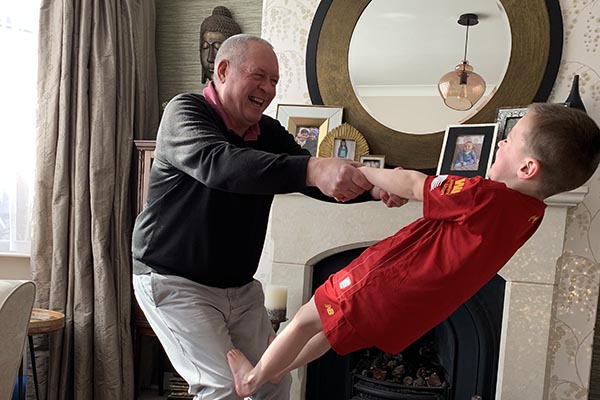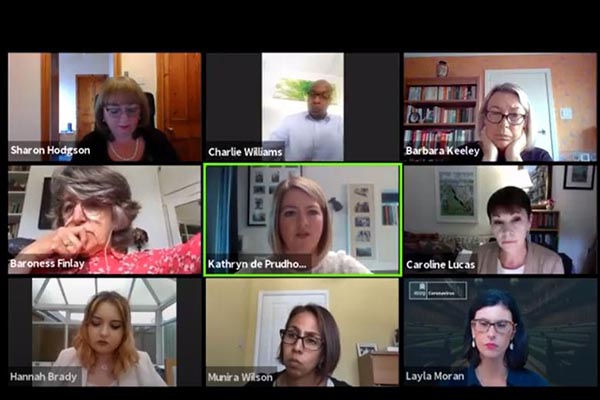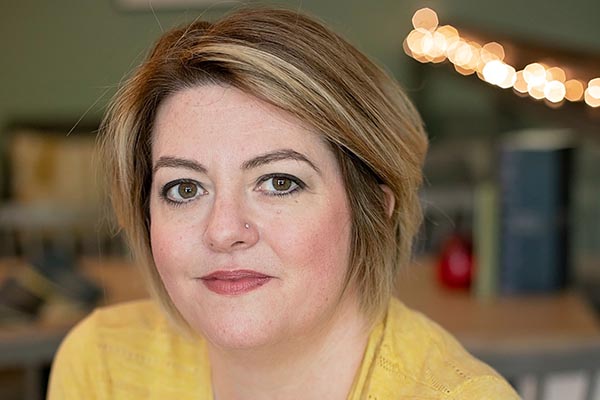Kathryn de Prudhoe’s voice cracked with emotion as she held up a photograph of her dad playing with her son.
The picture was taken the last time the family saw her 60-year-old father Tony Clay.
He died 23 days later in hospital from Covid-19.
Kathryn, a psychotherapist and one of our members, was telling her powerful and personal story as she gave evidence to MPs on the All Party Parliamentary Group for Covid-19 via a Zoom call.
Since her father’s death in April she has been working with the Covid-19 Bereaved Families for Justice group to lobby the government to provide funding for bereavement and trauma therapy.
She’s spoken to senior politicians and told her story in national newspapers.
She's talked to members of our policy team about our shared aims and campaign objectives for increasing access to therapy for people affected by the pandemic.
Kathryn was one of four people, whose fathers had died of Covid-19, to give evidence to the APPG on Wednesday.
She spoke movingly about the devastating impact her father’s death has had on her and her family, and called for a Government funded network of trauma-informed counsellors and psychotherapists through helplines, support groups and one to one therapy for those who need it, including children.
Holding up the photo of her father, she said: “He was 60 years old. He was fit. He was active. He had no underlying health conditions that we knew of."

The photo of Kathryn's father and son that she showed MPs.
“He had flu-like symptoms for two weeks. During the second week my mum became concerned. She called both 111 and the GP. They diagnosed mild symptoms and said stay at home, drink fluids and take paracetamol.
“When he finally made it into hospital it was too late to save him, despite receiving excellent care at the LGI (Leeds General Infirmary) he died from multiple organ failure after three days in intensive care.”
Kathryn described how she and her mum got the call to say doctors were withdrawing his life support. They had to stay outside three metres apart on camping chairs, as her mum was self-isolating. They were unable to hug.
“She spent the first 11 days after her husband died alone,” Kathryn said.
She told the MPs: “My mum, husband and I are all paying for private therapy. My children are struggling. They’re six and eight. My son; his granddad was his best friend. He cries three or four times a week for his granddad. My daughter is crippled with anxiety. She didn’t leave the house for weeks after my dad died because she was so afraid of catching the virus. They need the routine and structure of school and their friends, and specialist help to process their trauma.
“Many are not as lucky as we are. We already know the virus has disproportionately impacted the most vulnerable groups in our society. Some of our families are losing their homes and most cannot pay for private therapy.

Kathryn speaking at the APPG
She told the APPG: “My story also has a professional element. I’m a psychotherapist and I have grave concerns about the psychological impact of Covid-19 bereavement on many of the members of our group.
“Covid-19 bereavements are really traumatic, both in the nature of the death and the complexity of the circumstances surrounding them. As a result of that, the grief is very complex too.
"Family members have watched their relatives die slow agonising deaths, some have said goodbye on phonecall or videocalls. Others like us weren’t able to say goodbye at all.
“Most people haven’t been able to access their support networks of family and friends. Funeral restrictions have deprived us of this fundamental part of the grieving process."
She said that with Covid-19 there were a much higher number of people needing professional mental health support to process bereavement.
"There was already a huge funding gap in mental health services before Covid-19 with really long NHS waiting lists. Many third sector counselling services relying on trainees and volunteers to meet demand. Grief is a difficult process at the best of times but this grief is complex.
"Some relatives in our group are also suffering from post-traumatic stress due to the circumstances of their bereavement.
"These complex mental health issues need specialist support. This is a need which cannot be addressed by the goodwill of volunteers and trainees.”

Kathryn de Prudhoe
Kathryn told MPs about contacting a bereavement helpline set up by a local hospice.
“There are things like that available but they’re limited. It was also very clear to me as an experienced therapist that I was speaking to somebody who was fairly inexperienced and couldn’t do a lot more than just listen. They didn’t have trauma training."
She added: “There are thousands of private therapists up and down the country with trauma training, experience of dealing with trauma and bereavement. They are underutilised. They are a fairly mobile service, they can work from home, like this on Zoom.”
She mentioned to the MPs that BACP was a professional body which would have a take on how this investment could be made nationally.
We’re campaigning for the Government to maximise the role of counselling and psychotherapy to help those affected by Covid-19.
Find out more about the Covid-19 Bereaved Families for Justice group's petition and crowdfunder page.

Tackling the mental health consequences of coronavirus
Back our COVID-19 campaign to reaffirm the critical role that counselling and psychotherapy needs to play in supporting the nation through the coronavirus crisis and in helping to repair it afterwards.

Working with bereavement and complex grief resources
Explore the impact of Covid-19 on bereavement, grief and loss with our webinar and briefing resources

Coronavirus: Advice for the public
Advice on seeing a therapist during the pandemic, plus tips, advice and coping strategies from our members to help you through these uncertain times
